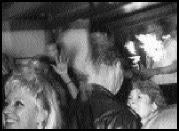KAREN MCDONELL may seem like an unlikely activist, but the Gig Harbor retiree and fanatical Dave Matthews devotee has a few qualifications that make her a convincing advocate against the cigarette giveaways known as “sampling”: She’s a cancer survivor whose brother, sister, and two grandfathers also had the disease, and she has a profound hatred of tobacco companies’ practice of targeting underage kids with samples, giveaways, and teen-oriented ad campaigns. She knows that cigarette sampling is on the rise in Washington state—tens of thousands of free packages of cigarettes were handed out last year alone. All of which, she believes, makes her an ideal advocate for a Senate bill that would ban tobacco sampling throughout the state.
McDonell says she first became aware of sampling during a Dave Matthews show at the Gorge last summer, when she witnessed what has become an increasingly familiar sight at the venue: Two “brawny young college kids” at the entrance handing out vouchers that could be exchanged for Camel cigarettes inside the company’s “Casbah smoking lounge.” Although entrance to the lounge, a permanent fixture at the Gorge, is restricted to those 21 and older, McDonell says cigarette companies reach their real target audience—underage kids—when adults pass off the free smokes to their younger friends outside. “I was really appalled that there were people who were paid to recruit new smokers,” McDonell says. “It really jacks my jaws that the tobacco industry is trying to hook these kids to pay them five bucks a pack every day for the rest of their lives.”
State law says tobacco companies can only give away free cigarettes and “smokeless tobacco” (snuff or chew) in adults-only venues, a designation that includes both bars and “smoking lounges” like the one at the Gorge. (Seattle and King County have both outlawed the practice.) R.J. Reynolds spokesperson David Howard says his company, which sponsors the Casbah lounge and also manufactures the Winston, Doral, and Salem brands, is careful to restrict its sampling events to smokers 21 and older by checking IDs and requiring participants—but not their guests—to “verify” with a signature that they already smoke.
But state Sen. Bob Oke of Gig Harbor, the irascible Republican who’s sponsoring the sampling ban bill, says the real purpose of such promotions isn’t to attract current smokers but to recruit new ones. “The tobacco companies very well know that the percentage of people over 18 that start smoking for the first time is almost zero,” Oke says. “They’re after the kids: 13-, 14-, 15-year-olds, and probably even younger.” Each year, the American Lung Association reports, some 430,000 people die from smoking-related diseases. “I visualize that in my mind as four Rose Bowl stadiums full of people—every year those seats are empty and the only new clients that they can get to fill those seats are our kids,” Oke says. Oke’s bill, SB 6337, passed the state Senate and went to the House health care committee for public testimony last Monday night. Tobacco lobbyists are working hard to defeat the bill.
Reynolds spokesperson Howard vehemently denies his company is targeting kids but acknowledges the company has little control over what happens to its cigarette samples once they’re outside a sampling venue. “I would hate to think that people would not be responsible and go out and do something illegal,” by giving cigarettes to minors, Howard says.
Oke’s office says tobacco sampling has increased by nearly 134 percent since the 1998 tobacco settlement, which banned billboard ads and brand-logo merchandise, among other marketing ploys. Howard concedes the settlement has created a more “challenging marketplace” for cigarette manufacturers. Sampling, he says, is one of the last available avenues for tobacco companies to win consumer loyalty. “Face-to-face interaction is really a good way to market our products,” Howard says.
Can the industry be trusted to police itself? Currently the state has little choice but to let it. The state Liquor Control Board, which regulates Washington’s legal vices, is supposed to make sure cigarette samples don’t end up in teenage hands. The problem is, the board only pays a visit to each licensed sampler once a year, which last year worked out to a paltry seven inspections. According to figures compiled by Sen. Oke’s office, between July and December 2001, cigarette companies held nearly 800 sampling events, distributing nearly 30,000 coupons and packs of cigarettes. “We really lack the resources to effectively enforce the tobacco sampling laws in terms of having the time to go out and investigate each of the events,” says the board’s legislative liaison, Rick Garza. “[If] 800 sampling events [were] going on in the state, we’d only be able to get out to a handful of those.” And although the board isn’t taking any position on Oke’s bill, Garza concedes it “would obviously make it a little easier” for tobacco regulators to do their jobs.
McDonell says that whatever happens to the bill, people ought to be “outraged” that tobacco samples are ending up in minors’ hands. “Didn’t you just think the day was gone when we would be targeting kids in that way—’Step right up and get these cigarettes for free!'” she says. To keep them from becoming smokers “we have to be advocates [for] our kids—if they don’t have access, they aren’t likely to start.”







